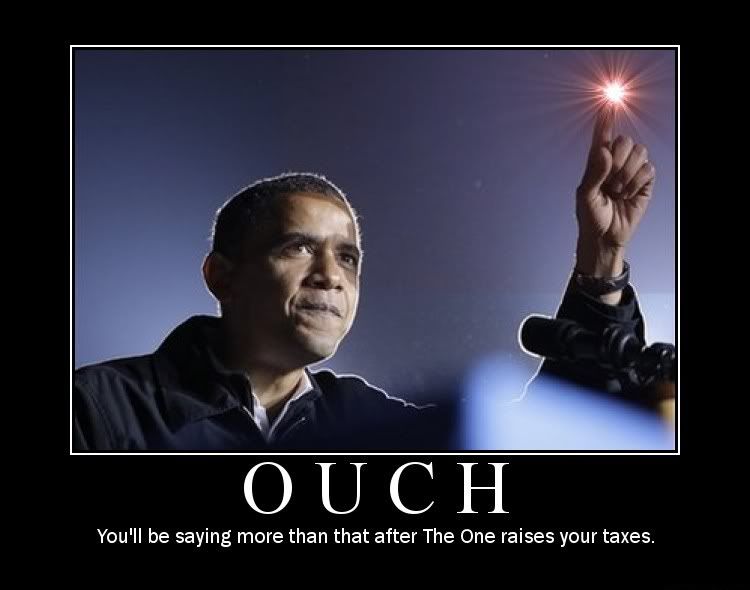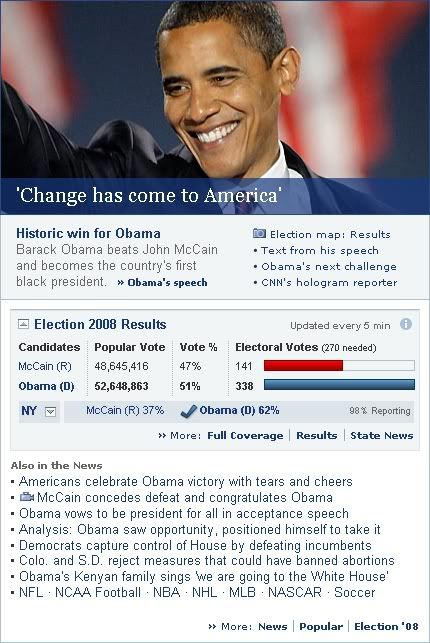"Autoworker chief pleads for government to save his job by stealing others' money to give to him"
If you want to know how well an American automaker bailout will go, look no further than AIG, which made the very same claims: "too big to fail," "bridge loan," "we need time to reorganize." The government gave AIG an initial $85 billion infusion, described as a "loan" -- which doesn't make sense, because loans are made to be repaid, and AIG wasn't expected to pay it back. It does make sense when one realizes it was all a bait-and-switch: the government didn't intend to make a real loan, but to buy out a strong controlling portion of AIG. And as scary as it should be to any liberty-loving person, it was merely a prelude to nationalizing the rest of the major insurers and other big industries.
And by the way, do the math: if you get 79.9% ownership for the initial $85 billion, then what does $152.5 billion get you? Doesn't it seem like the investment is effectively throwing money into a black hole? If you were a private investor who put $X into a badly performing company for 80% ownership, and suddenly you had a capital call for another 79.4% of your initial investment, wouldn't you start wondering if you should pull out while you can and write off the losses?
AIG claimed it would sell off "assets" to repay the loan, and the loan is necessary to keep it afloat because there's insufficient income to meet its debt obligations (in no small part from credit default swaps). If this were done by an individual, the situation would be someone who has a sudden cut in earnings, gambled away the next several months of pay, owes money right now to a great many people, and has been refused by banks for a loan to repay his existing debts. He just doesn't have the income to repay the latest loan. AIG effectively said it needed a payday loan for the next six months, which it will use to pay off the people currently breathing down its neck, and it will repay the latest loan by selling its furniture. Ask yourself: who in his right mind would become the next creditor to such an irresponsible person? No rational person would.
As I've said many times before, there's a reason the private sector wouldn't touch AIG, banks or the American automakers: nobody wants to for the kind of promised returns. Banks might give some returns, but most private investors don't judge it to be enough to warrant the investment. And in the case of AIG and the automakers, the probability of bankruptcy is so high that no private investor wants to take that risk. Government can take the risk, though, and have no qualms about it: it's other people's money, after all. The U.S. Treasury said, "It gives the company the room it needs in its capital structure to execute its asset disposition plan."
So it's even more ludicrous: what bank would lend you money to repay debts that you owe others, when you likely can't repay that latest loan, and then the bank will loan you an additional 79.4% of the initial amount so you can sell...assets...to repay the entire loan?
The absurdity of the AIG bailout is astounding, and we can expect no less when the automakers are bailed out. The feds have their blueprint to follow for any future bailouts.
Although the raw numbers and economic analysis show that the bailouts are a bad idea, let's put aside all economic theories of "efficiency," "sustainability" and the most nonsensical notion, "too big to fail." The only argument is a moral one: I and others are being forced to pay taxes to support others' livelihoods. Whether or not we'll do business with the companies is irrelevant. Chrysler has received my money four times, but that's beside the point: any money they receive from me, like with any other seller, should be perfectly voluntary. It should not come under the pain of death -- your death at the hands of government, should you refuse to hand over what you rightfully earned. At this point, I'll probably refuse to buy another "American" car just out of principle.
Moreover, as so beautifully stated here (do yourself a favor and read the whole thing),
Corporate bailouts are clearly unfair to taxpayers, but they are also unfair to the successful firms in a particular industry, who are implicitly taxed and burdened when their competition is subsidized. In a properly functioning market economy, the better firms—the ones that are more innovative, more efficient, and more popular among consumers—gain market share or increase profits, while the lesser firms contract. This process ensures that limited resources are used most productively.And the Heritage Foundation explained why failure is necessary here:
Third, bankruptcy is the only way to restore innovation to the U.S. auto industry. In the end, the automakers make money by producing vehicles that consumers want. But any government money is sure to come with strings attached. Pelosi, for example, said the government would exact a “[7] recoupment” for any investment of taxpayer funds — specifically, a say in what kinds of cars it produces. That’s a recipe for certain failure and future bailouts. Bankruptcy, in contrast, strips a company down to its valuable assets and then sets to putting those assets to work in the marketplace. Whether it works or not, it’s the best chance for success.That piece also mentioned that GM's market capitalization is down to $2.5 billion ($3.2 billion as of Friday's market close), so shareholders "wouldn't lose much." Not exactly, because shareholders who bought in at its $30 peak within the last year, or at its peak of $87 in January 1999, would lose a lot. But the point is still a fair one: GM is already so hammered that if it disappeared completely, that's only another 0.022 percent of the $14.5 trillion U.S. economy.
Let's put the market cap into perspective: GM is up to losses of $1.5 billion per month. What other company can lose 47% of its market cap each month and still stay open, or even be considered salvageable? A company like that is clearly too incompetently run and beyond all hope. Let it die.
Would additional jobs disappear? Certainly, as things realign themselves. Local supermarkets might lay people off, as autoworkers lose jobs and don't spend as much (or maybe move out of the area). A financial advisor might get canned when his client assets fall below the company quota, because laid-off people liquidate their retirement savings and maybe personal accounts. Some car dealerships are even shutting down because they aren't selling enough cars. That's life. You open yourself up depending on the personal and business associations you choose, so it's imperative that you exercise sound judgment -- and accept resulting risks -- about basing your job on a single industry or group of people in your area. As they go, so do you.
But state-worshippers believe in equality of outcome and want to ensure that no matter how incompetent you are, no matter how unproductive (i.e. lazy) you are, you'll have the same "equal" outcome as those who are successful because of their hard work and smarts. Anyone with an ounce of brain would then wonder, what incentive would anyone then have to be successful? In state-worshippers' fantasy world, Toyota and Honda might as well have produced completely random innovations, giving no thought at all to what might work, instead of entrepreneurial decisions that emphasized reliability, refinement and fuel efficiency. Let's also not forget that Japanese automakers aren't beholden to the insane compensation packages that the UAW demands, which is the reason American automakers can't make any money. It's first the hourly compensation that dwarfs their successful Japanese rivals (who still seem to attract many workers, so the wages must be pretty good), and then overly generous pensions that overly optimistically depended on consistently good future sales.
As I said in that post nearly three years ago, when will we stop treating every decision of life as backed by "the full faith and credit" of other taxpayers' wallets?
Unfortunately for the rest of us, the UAW bankrolled so many Democrats that they expect quid pro quo. A bailout isn't what's being debated, but what strings will be attached, and we can expect the $25 billion to be the tip of the iceberg. Gettelfinger and the rest of the UAW thieves can all go to hell -- but not before having diesel exhausts shoved up their sphincters with someone stomping on the gas.
Labels: Big government, Debunking economic fallacies, State worshippers






